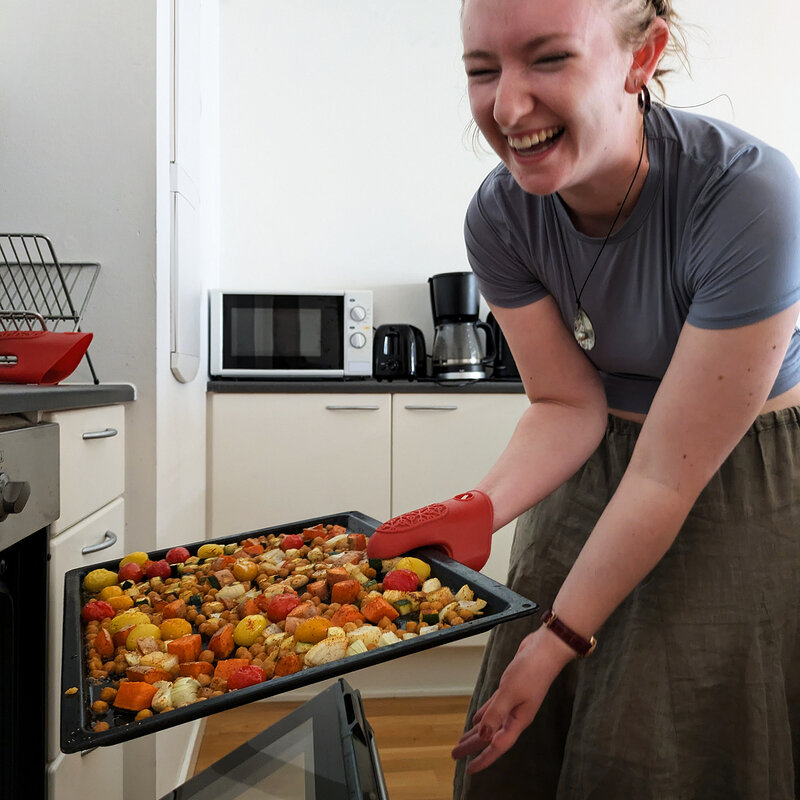

Inform DIS about your dietary needs
You will complete the Wellbeing and Accessibility Planning Form in your Student Registration, where you can list details about your dietary needs.
All dietary restrictions for Study Tours are based on the information you provide in this form, so it’s important to be specific from the start.
We are committed to providing reasonable accommodations for students with documented dietary needs and allergies for DIS-sponsored meals, but we can’t guarantee that mistakes or misunderstandings won’t occur. Some forms of dietary restrictions, including severe allergies, can be a bit trickier to accommodate.
It is ultimately your responsibility, as the expert on navigating your dietary needs, to take similar steps as you do at home: plan ahead, be flexible (especially when substitutions are limited and may not be ideal), ask questions to verify the safety of what you eat, and have a plan for any allergic reaction.
Navigating religious dietary needs
Finding specific products or restaurants in both Copenhagen and Stockholm should pose no significant problems, and many previous students have done so in the past.
We offer resources and guides for our students on-site, but we recommend that you do independent research as well.
Please make DIS aware of your religious dietary needs so we can ensure that they are met while on Study Tour or at a DIS event.
Grocery shopping
Most products in the supermarkets will be in Danish or Swedish, so using a translation app or pocket vocabulary reference will help you greatly to find your grocery store basics. When in doubt, as for assistance from the grocery store staff – many speak English and will be able to help you out.
Be ready to explore new brands and products and remember, like in the U.S., specialty foods can be more expensive than mainstream products and stores. Expect to go shopping in multiple stores to find what you need, especially if you are on a limited budget. The cheapest grocery stores may not always have the products you are looking for, or carry all items consistently.
Set expectations
Research in advance to find safe food options, and you might discover exciting new meals. However, don’t expect every meal to be different—depending on the destination, you may repeat meals or rely on your own snacks based on availability.
Call your airline
Reserve special meals well in advance of your scheduled flight. Some airlines will require that you state your special meal preferences at the time of booking. If needed, call the airport in advance to see if you can purchase certain foods past security (for example, plain yogurt).
Bring back-up snacks
You can never really predict what you will find in local supermarkets, or if a meal you ordered has a restricted product in it by mistake. Plan to bring a few snacks – more than you think you will need – just in case!
Consider language barriers
Think strategically about how to communicate dietary restrictions in non-English-speaking areas. Carry a note with key phrases in the local language or use travel cards that translate your restrictions into multiple languages for easier communication with chefs.
Do your research
If you know you’ll be in a certain city, check out local specialty stores or restaurants. Consider making an order or reserving a table in advance. The restaurants may be able to cook something special for you if you give them advanced notice.
Clarify your needs
Don’t leave the waiter guessing! When you order your meal, directly inform the waiter how you define your dietary restriction and how you need your food to be prepared.
Always ask
If you are unsure of what is contained in a product or meal, ask first, as there may be hidden ingredients that could affect you.
If you have questions about how to best navigate your dietary needs while abroad, our staff at the Student Hub are happy to help.
Be flexible
Especially in group travel situations, remain open to the situation. Even if the restaurants you visit agree to make special accommodations, you may need to supplement your meal to ensure you get enough to eat. Always have a back-up plan.

Navigating severe allergies abroad
With a severe nut allergy, Caroline (Trinity College) shared her advice for figuring out where and what to eat in Denmark.

Copenhagen guide for halal offerings
Wondering where to shop for halal food in Copenhagen? Check out our guide to grocery stores and restaurants with halal offerings.

Five tips for being vegan in a kollegium
For Zoë (Carleton College), preparing all her own meals was a new experience after living on campus at her home university. Here’s what she learned along the way.

Copenhagen guide for gluten- and dairy-free students
“Luckily, Copenhagen is a dietetic person’s heaven, so finding places to eat was a piece of (gluten-free) cake,” said Emma (Loyola University Maryland).
